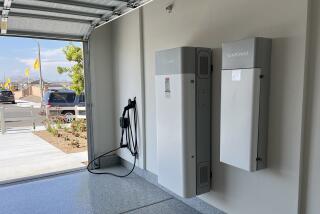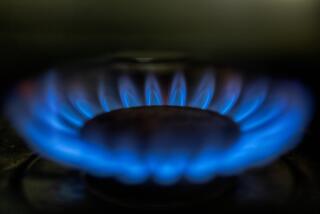Lots of Options Cooking for Back-Yard Chefs
- Share via
When Tony Higson throws another shrimp on his barby, he doesn’t pollute the air.
Charcoal lighter fluid was banned in Australia three years ago--because of safety concerns, not smog--and consumers don’t seem to miss it, said Higson, who represents a company that manufactures Blazer, an alcohol-based gel that is squirted onto charcoal.
“Products like this are completely safe, odor-free and pollution free. Everyone uses them in Australia,” Higson said.
The fire-lighting gel, which is expected to be available in Southern California stores in a few months, is one of several barbecuing techniques that satisfy the requirements of a new regulation that bans the sale of polluting barbecue products.
Lighter fluid and self-starting charcoal will have to be removed from store shelves beginning in January, 1992, unless manufacturers can reformulate them so they emit 80% less pollution, according to the new rule imposed Friday by the South Coast Air Quality Management District.
In honor of the unusual item on the agenda, several manufacturers showed off their smog-free cooking techniques by grilling hotdogs and sausages for breakfast in the AQMD’s parking lot.
“We all grew up with the fluid. It’s second nature to use it. But we need to find alternatives if we are to have an environment in the future,” said William Brady of Meteor Inc., a Monrovia company that makes electric starters and chimney starters, two devices that meet the requirements of the low-smog rule.
“If people know about the alternatives that already exist, they’d use them,” he said.
James Lents, the AQMD’s executive officer, said the alternatives are not only cleaner, but can save consumers money.
Most gas and propane grills cost several hundred dollars, but they are cheaper than charcoal and lighter fluid in the long run. Electric starters for charcoal grills and chimney starters--metal cylinders in which coals are piled on top of crumpled newspaper--cost about $10 apiece.
The AQMD estimates that each cookout using lighter fluid can cost up to $1.59, while an electric starter or chimney costs 60 to 65 cents per use, propane costs 12 cents and natural gas grills cost 6 cents. Starting gels and fire chips are also less than lighter fluid, the agency estimates.
“I don’t even consider it a small sacrifice by consumers because there are so many products that are environmentally cleaner,” said Riverside County Supervisor Norton Younglove, the AQMD’s chairman. “At most it’s a minor inconvenience.”
Retailers say the options work just as well as lighter fluid.
“People who buy the chimneys really like them,” said George McHarris, owner of The Village Patio Shops in Irvine. “It may take a few minutes longer, but it works just as well.”
More to Read
Eat your way across L.A.
Get our weekly Tasting Notes newsletter for reviews, news and more.
You may occasionally receive promotional content from the Los Angeles Times.










